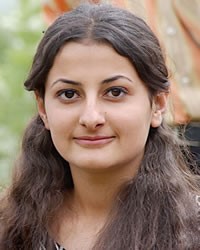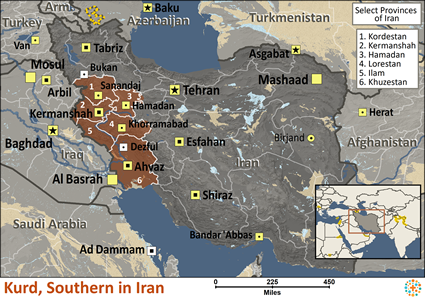The Southern Kurds of Iran are actually part of a much greater Kurdish population. They are made up of a number of clans, tribes, and tribal confederations, many of which have been in existence for thousands of years. This large people group shares several important and common ties. For instance, they speak a group of closely related languages, they have a shared culture, they have a common geographical homeland, and they have a common sense of identity. Kurds are basically more alike than are other people groups, and they feel it.
The Southern Kurds of Iran live along the Iraq-Iran border in the Iranian provinces of Kermanshah and Luristan. Their languages differ from the Kurmanji spoken by the Northern Kurds.
Though the Southern Kurds enjoy a milder climate than do their relatives farther north, both groups face many common problems. Water is scarce, and there are persistent problems with such diseases as trachoma, tuberculosis and malaria.
Southern Kurds make their living in much the same way as their relatives in Turkey and Iraq, farming and raising cattle and goats. The area is well wooded and a few still live the semi-nomadic lifestyle of their ancestors. However, most still live in small villages of under 2000 people.
Generally speaking, the Southern Kurds are better off than the Kurds in Turkey, especially in regard to land ownership. Since 1960, land reform has allowed nearly one-third of the Kurds to buy their first plots of land. However, they are still culturally repressed, their language banned, and their children forced to learn Persian in schools. There is much hostility between the Sunni Muslim Northern Kurds and the Shia Kurds farther south.
The most important Kurdish national festival is the New Year celebration which is held on March 21st. This is a long ceremony that may continue for a week or more. Many specific foods and condiments are prepared in advance. They grow special flowers for the occasion and branches covered with fresh buds are cut and made to adorn the feast. They wear new clothes and they break old pottery for good luck. People visit each other's houses, and old feuds and misunderstandings are reconciled for the occasion. People give gifts to those younger than themselves and high ranking officials.
Nearly all Kurds are Muslim, most being Shafite Sunnis. They first embraced Islam after the Arab conquests of the seventh century.
Despite being predominantly Sunnis, religion has created deep rifts among the Kurds. These differences also have prejudicial overtones towards the lower class. Many of the dispossessed Kurd minorities have become associated with the secret and unorthodox sects of Islam—the most fervently rebellious people in Kurd society.
Since they live in an area where water is scarce, the Southern Kurds need to be educated in irrigation and agricultural techniques. This would greatly improve their cultivation of crops and successful raising of cattle. Their persistent problems with certain diseases show the need for improved medical services.
Ask the Lord to call people who are willing to go to Iran and share Christ with Southern Kurds.
Pray for Iran to soon open to the true gospel of Jesus Christ.
Ask God to protect and anoint the few known Southern Kurd Christians.
Pray for Southern Kurdish leaders to have dreams and visions of the risen and victorious Christ.
Ask the Lord to raise up a Southern Kurdish disciples who will disciple many.
Scripture Prayers for the Kurd, Southern in Iran.
https://en.wikipedia.org/wiki/Southern_Kurdish
https://en.wikipedia.org/wiki/Kurds_in_Iran
| Profile Source: Joshua Project |


























